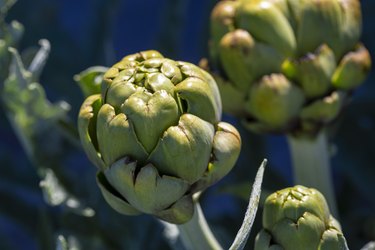
Artichokes are a foodie favorite frequently featured on Mediterranean menus and tasty tapas platters. But there's a new kid on the block — artichoke tea — and advocates claim artichoke tea benefits weight loss and other health conditions. So what's the deal with this new brew?
Read more: 6 Teas to Stock Up On and Their Health Benefits
Video of the Day
Video of the Day
Health Benefits of Artichoke
Actually, artichoke tea isn't new at all — it's a traditional Vietnamese drink made by steeping whole artichokes, or artichoke leaves, in hot water. If you buy commercially produced artichoke tea bags, they probably were produced in the Dalat region of Vietnam, according to the University of Arizona.
Most of the buzz around the health benefits of artichokes is associated with the ingredient cynarin, which is contained in the leaves of the vegetable. According to Harvard Health Publishing, cynarin helps increase the liver's production of bile, which in turn can remove cholesterol from the body.
In a May 2016 clinical trial published in the International Journal of Hepatology, 60 people with non-alcoholic fatty liver disease were given either a supplement of artichoke leaf extract or a placebo. The results showed that those given the extract had reductions in blood cholesterol and triglycerides. They also showed improvements in liver enzyme levels, suggesting a reduction in liver damage.
How you consume artichokes may also be a factor in whether you get significant health effects or not, according to Isa Kujawski, RDN, MPH, a registered dietitian nutritionist based in Ann Arbor, Michigan. And artichoke tea may not make the grade.
"Studies that demonstrate heart, liver and digestive health benefits have all generally used a concentrated artichoke extract, which might be expected to have higher levels of active ingredients than the tea," Kujawski says.
Artichoke Tea and Weight Loss
As for the idea that artichoke tea can help whittle your waistline, "There is zero evidence that it is beneficial for weight loss overall," Kujawski says.
"The bottom line is that consuming artichoke tea may be beneficial as part of a healthy lifestyle which also takes into account holistic factors such as nutrition, movement and stress management," Kujawski says. "But it's important not to overblow the alleged medicinal and health-promoting qualities of artichokes and label them as a single magic pill or weight loss remedy."
That said, there is some evidence that artichokes might help promote healthy insulin responses, Kawasaki says. In a December 2015 Plant Foods for Human Nutrition review, boiled artichokes eaten as a vegetable with a meal reduced the influx of sugar and insulin into the body. However, this effect was only seen in healthy people; those with metabolic syndrome — who are at higher risk of diabetes — did not show beneficial changes to blood glucose and insulin.
Taking an Artichoke Supplement
Studies that do indicate a health benefit of artichokes mostly used supplements containing concentrated artichoke extract. If you want to try such a supplement, there's not too much to go on to inform your choice of product.
However, in an August 2017 meta-analysis of studies in Critical Reviews in Food Science and Nutrition, the dosage producing a modest cholesterol-lowering benefit varied from 600 milligrams to 2,700 milligrams of artichoke leaf extract per day, though the extracts were not standard in terms of their concentration or level of active ingredients. This dosage range of artichoke extract seemed well tolerated across participants with few side effects.
The Mayo Clinic says that when choosing herbal supplements, such as artichoke extract, it's a good idea to buy brands that have been tested by independent sources — like ConsumerLab.com or United States Pharmacopeia (USP) — as well as checking FDA alerts and advisories for any reports of adverse effects. This is because herbs and dietary supplements are not regulated as strictly as over-the-counter drugs.
- University of Arizona: “Artichoke”
- Harvard Health Publishing: “Vegetable of the Month: Artichokes”
- International Journal of Hepatology: “The Effect of Artichoke Leaf Extract on Alanine Aminotransferase and Aspartate Aminotransferase in the Patients With Nonalcoholic Steatohepatitis”
- Isa Kujawski, RDN, MPH, registered dietitian nutritionist, integrative health coach, Ann Arbor, Michigan
- Plant Foods for Human Nutrition: “Pharmacological Studies of Artichoke Leaf Extract and Their Health Benefits”
- Critical Reviews in Food Science and Nutrition: “Lipid-Lowering Activity of Artichoke Extracts: A Systematic Review and Meta-Analysis”
- Mayo Clinic: “Herbal Supplements: “What to Know Before You Buy”